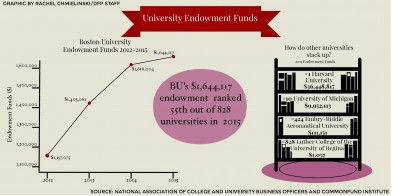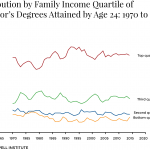
Boston University is one of the 56 colleges and universities in the United States to have received a letter from the Senate Committee on Finance and the House Committee on Ways and Means as part of the federal government’s increased effort to examine endowment-spending policies, BU’s Dean of Students Kenneth Elmore confirmed.
The 56 higher education institutions are private colleges and universities that have endowments more than $1 billion, according to a January 2016 report from the National Association of College and University Business Officers and the Commonfund Institute.
“The Committees are conducting additional oversight of how colleges and universities are using endowment assets to fulfill their charitable and educational purposes,” the letter sent Monday to Harvard University stated. Harvard’s letter has been cited in a number of articles online.
BU spokesman Colin Riley said BU was also sent the notice and will fully cooperate with its guidelines.
“BU received the letter and we plan to respond,” Riley said.
Riley said BU is deliberate in its endowment spending, especially due to the specific terms under which donations are made.
“We have a very modest endowment for a school our size,” Riley said. “We are a tuition-dependent school, and much of the endowment has restrictions by the donors that dedicate that revenue to a certain purpose.”
BU had a $1,644,117,000 endowment in the 2015 Fiscal Year, according to the report. The 2015 endowment shows a 1.7 percent increase from the $1,616,004,000 in FY 2014. BU’s endowment also saw an increase of 15.2 percent from FY 2013 to FY 2014, according to a Jan. 30, 2015 NACUBO report.
Harvard, Yale University and The University of Texas System rank first with approximately $36.4 billion, second with $25.6 billion and third with $24 billion, respectively, in the FY 2015 endowment list.
The letter is an additional federal action to increase scrutiny on private universities and colleges. Previous actions include the Internal Revenue Service’s revision of a document to more thoroughly probe information on endowments of tax-exempt private colleges and universities every year, according to the letter.
“Despite these large and growing endowments, many colleges and universities have raised tuition far in excess of inflation,” the letter stated.
A questionnaire attached to the letter asks schools to provide information requested from the past three tax years, and, as much as possible, from the current tax year.
The thirteen multi-part questions examine schools’ relationship with donors, dedication to financial aid and conflicts of interest. The schools also must disclose endowment amounts, the percentage spent and payout percentages.
Several students said transparency is the key to keeping a school’s spending in check, as any school’s spending should be for the benefit of students and their lives on campus.
Brianna Brooks, a junior in the Sargent College of Health and Rehabilitation Sciences, said BU should prioritize the well-being of its students, and its spending should reflect that.
“BU is an educational institution,” she said, “so its main priority should be its students, and they should be more transparent to make sure the students are benefitting from any money the university has.”
Caitlin Stavish, a sophomore in the College of Arts and Sciences, said attending BU is a major financial commitment, and students therefore deserve to have the opportunity to access information about the school’s spending.
“We spend so much on tuition,” she said. “Not knowing where our money is going is depressing, and it’s not fair.”
Tess Jutras, a freshman in the College of Communication, said large amounts of money are a necessary evil in operating a school, and it is also the school’s responsibility to make life better for its students.
“Colleges need a continuous income to be able to maintain and make improvements when needed, which is why large donations are always taken so seriously and publicized so much,” she said. “It’s important to spend money on students, but I feel like most of the time, the way that money is spent on students is very indirect.”




